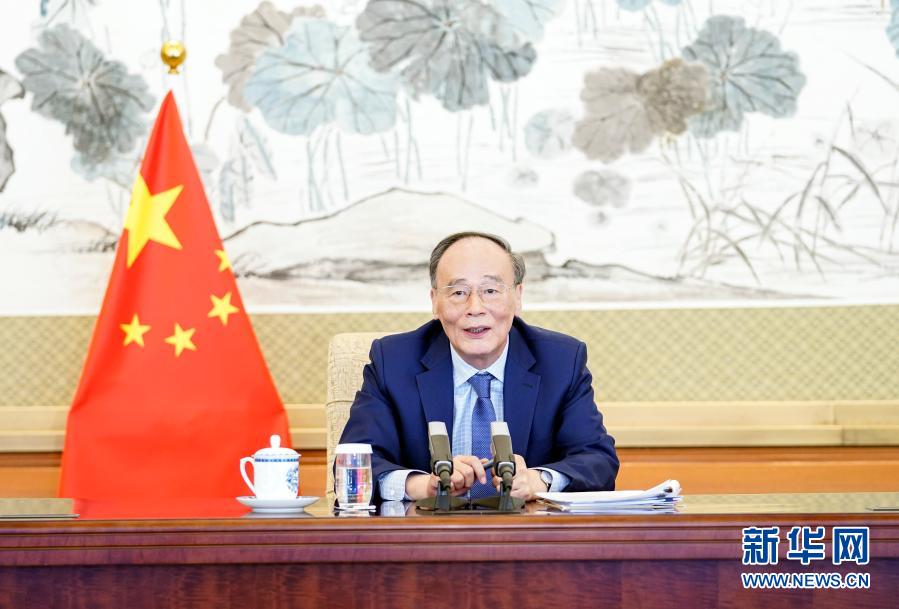VP Wang Qishan shares promising vision for Sino-US ties
By Andrew Korybko | chinadaily.com.cn | Updated: 2021-02-08 08:58

Chinese Vice-President Wang Qishan made a virtual appearance during 12th China-US CEO and Former Senior Officials' Dialogue on 29 January. He told the participants that "Upholding the spirit of nonconflict and nonconfrontation, mutual respect and win-win cooperation, as well as focusing on cooperation and managing differences are the keys to promoting the healthy and stable development of Sino-US relations." This is a promising vision for China-US ties and one that should be embraced by the American side as soon as possible. For that to happen, however, China's counterparts must first overcome some of their domestic difficulties.
Although it was only in power for four years, the former Trump administration dealt enormous damage to China-US relations. Spy mania, a new "red scare", and even anti-China xenophobia are now regrettably prevalent among some levels of society after being encouraged from the highest echelons of the government itself. These counterproductive sentiments were cultivated to distract Americans from internal issues by redirecting the focus of their attention toward "the other". Former president Trump targeted China for this role in order to justify his trade war and other aggressive actions like those in the South China Sea.
The new Biden administration must have the political will to resist the partisan pressure to continue the politically Sinophobic policies that it inherited. But if it can successfully surmount this challenge, then a bright new future awaits China-US relations. Some elements of competition might naturally persist in their relationship, but they can easily be managed as long as the US respects China's legitimate interests, especially those related to its internal affairs and territorial integrity. Abiding by such clearly defined red lines is the first step toward improving ties.
Both countries have much more in common than the mainstream media makes it seem, especially self-interested forces in the US. China and the US are threatened by climate change and the COVID-19 pandemic just like the rest of the world is, which should be prioritized as the first trust-building exercise for repairing relations if President Biden has the political will to do so. That would also send a very powerful message to the rest of the world that they're willing to put their mutual differences aside in order to promote the greater good of humanity. From there, other forms of cooperation can develop.
China is interested in making progress on Phase II of the more comprehensive trade deal that it began negotiating with the Trump administration, so President Biden would do well to focus on this in order to resolve their economic differences once and for all. Upon doing so, China and the US could potentially seek to expand their cooperation through multilateral pacts such as the Comprehensive and Progressive Trans-Pacific Partnership (CPTPP), which both of them are interested in joining. This could ultimately result in the creation of a mega trade bloc connecting the Regional Comprehensive Economic Partnership (RCEP) and the USMCA.
Their economic rapprochement could also take the form of joint development projects in the Global South. Some African, Asian and Latin American nations urgently need such assistance, and instead of competing with one another in this respect like the former Trump administration sought to do, it would be to everyone's benefit if China and the US cooperated instead. To that end, President Biden shouldn't oppose Beijing's Belt and Road Initiative (BRI) like his predecessor did, but should even explore means to cooperate with it such as in the aforementioned areas that most urgently need developmental support.
So long as President Biden has the political will to improve relations with China, then the entire world can change for the better at precisely the moment when it needs to do so most. Clinging to his predecessor's outdated hegemonic ambitions in the post-COVID-19 era is counterproductive for everyone and will only make the ongoing global systemic transition all the more painful and longer. It's therefore best for President Biden to bravely chart a new era of relations with the world, which should start by reconciling with China through the proposed courses of action. Only then can the world be safer and more stable, which will improve everyone's lives.
Andrew Korybko is a Moscow-based American political analyst.
























